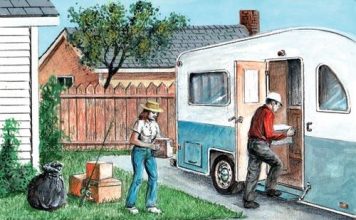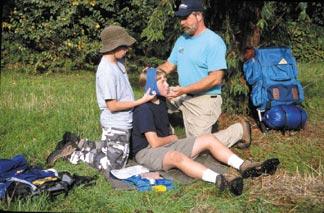 |
|
| Issue #133 • January/February, 2012 |
As I write this article, it’s early September. And September, as you may or may not know, is National Preparedness Month, sponsored by the Federal Emergency Management Agency (FEMA). This is the time of year when we are officially recognized for our efforts to prepare for hard times. This is also the month we recognize everyone else who will ignore or poke fun at our efforts until the bleep hits the fan, after which they suddenly become our best friends and want us to share our supplies with them.
The subject of preparedness is so massive that I can barely scratch the surface in a single article, but it’s a start. Websites such as Survivalblog.com can provide much more comprehensive information.
In a nutshell, preparedness refers to the stockpiling of goods, supplies, knowledge, reference literature, and other essentials in order to better weather natural disasters, terrorist attacks, economic uncertainty, and other difficulties. Preppers (as we’re called) know our efforts will not insulate us from hard times, but will help cushion the blows of regional or national emergencies which are out of our control.
By definition, “prepping” means preparing in advance of hard times, not after. This little subtlety that preparing is best done before rather than after a serious event seems to escape a lot of people. A typical example is the panic that ensues whenever a hurricane approaches landfall there is widespread chaos at grocery stores, Home Depot locations, and gas stations as people frantically try to get ready for something they should always be prepared for anyway.
|
When Hurricane Irene came ashore in August, I asked readers of my blog (www.rural-revolution.com) who were in the path of the hurricane to check in and report how things were going. Many readers wrote about the frantic crowds at grocery stores, of shelves stripped bare, of panicked lines at gas stations.
Three testimonies from my readers stand out:
“It is amazing how people react to the news of a hurricane. There appear to be very few people prepared, which is surprising to me as we usually get a hurricane here once every other year or so. I had to work yesterday, but swung out at lunchtime to top off my car with gas. The local grocery stores were packed! I passed by two other gas stations with lines out of the parking lot. Later after talking to people it seemed that people either fell into two categories, either they were panicking trying to get everything they needed now or they weren’t going to bother at all. My most surprising conversation was with a good friend who has two children and doesn’t even have a flashlight in her house let alone water and non-perishable food. Sure is an eye opener.”
“I’ve only been prepping for about a year, but have made significant strides. All I had to do yesterday to prepare was secure things in the yard that could blow away. It was amazing to me how frantic and panicked people seemed to be! I was absolutely calm, no pressure at all. I had food, water, shelter and backup plans if needed. It’s good to be prepared, really lowers the stress level. I often wonder why more people aren’t prepared.”
“This is the first hurricane since I officially became a “prepper” and it totally shocked me. There was almost nothing left to do. We were able to spend all of our time getting our animals set and taken care of. We gassed up the cars midweek. The only thing left for the last minute was to purchase a cooler full of ice and draw up lots of water for the stock. Wow, what a stress-free way to live.”
I think everyone can agree: it’s far better to be prepared than not. But preparedness comes in a lot of different flavors and intensities, depending on the personal level of concern by the individuals involved.
How you prepare depends on endless numbers of factors. Your location (urban vs. rural), type of home (house, apartment, mobile home, etc.), numbers and ages of family members, health, income these issues will all affect what kind, and to what extent, you can prepare.
Many people feel it’s easier to be prepared in a rural location, and to some degree this is true. Livestock, gardens, space for stored supplies, and a lesser likelihood of roving gangs of looters are all benefits of living in the country. But living in the country is no guarantee that Preppers will escape any problems. And this does not excuse our urban cousins from preparing to handle emergencies as best they can.
This article will focus not so much on the nuts-and-bolts of what to store, but rather on some general things to consider. These considerations must then be tailored toward your particular circumstances.
Short-term preparedness
It’s helpful to know what you’re preparing for. Preparedness can roughly be divided into two categories: short-term and long-term.
Short-term preps generally are meant to address local and regional events. Here in rural north Idaho we prepare for wildfires, earthquakes, and blizzards. Other locations need to prepare for tornadoes or hurricanes as well. Urban short-term preparedness may consist of all of the previously listed natural disasters, but might also include social unrest and acts of terrorism.
In the short-term, most urban situations can be handled by staying indoors rather than roaming the streets or attempting to bug out to a rural area. When riots or other social unrest erupts, your chances of escaping looters is fairly high if you stay inside and make sure your doors and windows are barricaded or at least patrolled from within.
For short-term preparedness, I recommend having at least three months of supplies in the Seven Core Areas (listed later in the article). Why three months? Under even the most dire regional conditions, things will usually shake out by the end of three months. Outside help will become available, or conditions will otherwise change.
Keep in mind that if things are in chaos for a week or more, your unprepared neighbors may ask you for help. And you should help, if for no other reason than long memories after the crisis is past. It’s important not to forget charity and mercy during an emergency.
|
Long-term preparedness
What conditions would necessitate long-term preparedness? This would mean an interruption of our way of life on a national (or extended regional) scale. Along these lines, I have concerns about two possible scenarios.
The first is that our country will experience an economic collapse, in which case our best “savings account” is what is euphemistically called “tangibles.” (In Prepper lingo this is known as beans, bullets, and band-aids.) A collapse of our banking system and its fiat currency could result in massive employment and other financial hardships.
A second possible scenario that concerns many Preppers is the loss of our national power grid either through natural events such as massive solar flares or through terrorism (electromagnetic pulse weapon detonated in the upper atmosphere which will incapacitate the power grid). Our country is no longer capable of functioning without electricity. If you’ve read the book One Second After by William R. Forstchen, you’ll understand the need for additional supplies to handle a long-term interruption of services.
Under these conditions, having adequate supplies in the Seven Core Areas will help people survive in moderate comfort. By “adequate” I don’t mean you’re living in the lap of luxury; I mean you’re not starving, freezing, or sitting in the dark.
Rule of Three
We have some prepared neighbors who abide by what they call the Rule of Three (see Issue #111, May/June 2008). What this means is they have one main and two backup methods of doing whatever needs to be done (in other words, a backup to their backup). Cooking, heating, lighting, and communications are all aspects that need backups of backups in case the primary method(s) are incapacitated.
These neighbors are off-grid, so having that Rule of Three for everyday necessities has allowed them to live comfortably under conditions many of us would find difficult. So in your preparations, think in terms of multiple backups in case your primary source fails.
Bugging out vs. bugging in
The decision whether to bug out or bug in (hunker down) depends on the nature of the emergency as well as your physical location. A few scenarios:
Riots are hitting your urban area: Stay indoors, barricade doors and windows, and hunker down. Do not draw attention to yourself.
A Category 5 hurricane is approaching your low-lying coastal property: Gather your grab-and-go kits and get out.
An economic crash has plunged our nation into a severe depression and resources are scarce: There is no easy answer to this situation. Bugging in (staying in the city) will only work until your supplies are gone or your safety is compromised. At that point, bugging out may be your only option if you have someplace to bug out to.
Hunkering down (bugging in) is a legitimate option for many people under a number of emergency circumstances. But that doesn’t mean you just lock your doors. Hunkering down means you create your bug-out retreat right there at home. That means having your Seven Core Areas stocked and ready.
However, bear in mind that no one can be self-sufficient in an urban apartment. The best you can hope for is to stay safe until the immediate crisis passes.
Bugging out from an urban location opens a whole new can of worms. Unless you have a fully-stocked self-sufficient rural retreat (and who does?), then you’ll probably be trespassing on the kindness of rural friends or relatives. How long will you be staying? How long can they support you? It’s almost impossible to say, since no one can predict the duration of a major emergency.
All I can suggest in this case is: (a) bring every supply you can possibly cram into your vehicle; (b) be the most gracious houseguest you can possibly be. Remember it’s not your home, so be prepared to work for your “rent.”
|
You’re not Euell Gibbons
Remember Euell Gibbons? (“Ever eat a pine tree? Many parts are edible…”) Gibbons was known for his ability to literally live off the land.
Most of us aren’t Euell Gibbons. Most of us wouldn’t know an edible plant if it bit us on the butt. So whatever you do, don’t think you can “live off the land” if the bleep hits the fan just because you know what a blackberry bush looks like.
One time while lurking on a “green” forum, I posted a question: If you’re in an urban area and the bleep hit the fan, what would you do? Do you have any food stored away? I receive the usual we’ll-all-join-hands-and-sing-Kumbaya type of answers, but one reply made me blink in astonishment: this person didn’t see the need to store any food because he would simply forage for all his dietary needs from wild plants in vacant lots.
This kind of sheesh, what would you call it? Ignorance? Naiveté? Stupidity? (yeah, that’s the word) always astounds me. Assuming you could even identify edible plants, just how much filthy polluted plantain can you collect in order to keep yourself and your family alive? How will you cook it? And what happens when the vacant lot is stripped bare of everything except broken glass and tin cans? Would you even dare to step outside your apartment and risk meeting roving mobs while you search for wild purslane and dandelion shoots?
And please, don’t even get me started on the “mountain-man” hunting scenario. I don’t care if you’re the greatest recreational hunter in the world you won’t be able to survive off your hunting, especially if you live in the city. Where will you hunt? How will you get there? Will the locals welcome you? (Remember, if people are hunting for survival, you’re no longer a visiting cash cow you’re competition for a limited resource.) How will you get your meat back home? How will you preserve it?
There’s a reason humans moved from hunter/gatherer societies to an agricultural-based culture: food sources are more secure. To assume you can suddenly move back into a hunter/gatherer mode to survive while living in a city, no less is lunacy.
You’re not Rambo either
A popular whimsy among some male survivalists is the Rambo fantasy. They have vague thoughts of gunning down any and all threats to their survival. Let a starving mother with a crying toddler knock on the door and plead for a bowl of cereal, and Mr. Rambo will threaten to blow her away rather than treat her with compassion. (That said, my elderly aunt who lives in Louisiana told me how this was a common ploy for home invasion robberies after Hurricane Katrina hit.)
This kind of hyper-machismo is asking for trouble. I firmly believe part of being prepared is being suitably armed, but if you’ll pardon my French, don’t start talking from your balls. Be sensible in your defenses.
In my aunt’s case, after hearing about a number of these home invasions, she refused to answer the door at all. Other people answered the door while fully armed. All I’m saying is, don’t go looking for trouble. Just be prepared to handle it if it arises.
Practice, practice, practice
No matter how fully prepped you think you are, you won’t know for sure until an emergency arises. But the least you can do is make sure (a) you know where all your emergency supplies are located; (b) your equipment is in working order; and (c) you know how to use it. (You’d be surprised how many people panic-buy generators before a hurricane but don’t have the faintest notion how to hook them up.)
If the power goes out, the last thing you want to do is grope around in the dark trying to find your flashlight, only to find the batteries are dead because the kids were playing Spook. Know where your equipment is and make sure it’s in working order.
Once you feel you’ve thought through every contingency and you’re reasonably prepared, the best possible thing you can do is shut off the power for a week and prove it. There is no finer way to discover your weaknesses and vulnerable spots than to stage an “emergency.” That’s why professional emergency services stage drills.
Operational security
This is advice we ourselves have not taken because of our rather public involvement in teaching Prepping and self-sufficiency, but I suggest you practice Operational Security (OpSec). In a word, shaddup. Keep your preps quiet and low-key. Don’t talk about it. Don’t brag. Don’t announce to the world what kinds of firearms you possess and how much food you have stored.
The reason is, there will always be somebody happy to liberate you of your supplies. Nuff said.
|
The Seven Core Areas of Preparedness
I’ve listed below what I call the Seven Core Areas of Preparedness. I need to stress that this list is by no means comprehensive. However, if you’re prepared in these seven areas, then you can focus on achieving other, more tailored preparations to suit your particular circumstances.
Food
This is obvious. I don’t mean you should stuff your freezer with TV dinners, either, because if the power goes out, they’re gone. Consider purchasing staples you enjoy eating (rice, beans, oatmeal, etc.) and learn to store and prepare them. These have the added advantage of being dirt cheap. If you want to take the next step, learn to can. Properly canned food lasts years without refrigeration, and canning is a valuable skill as well. Alternately, buy lots of commercially canned food.
Along with storing food, you should have the means to prepare it. Your options will be more limited if you’re in an urban high-rise apartment (where you can’t install a wood cookstove, for example), in which case your food will have to be pre-cooked (such as MREs) or otherwise edible without cooking. Eating unheated soup or beans right out of a can might not be the most pleasant meal, but at least you won’t starve.
Water
Without water to drink and wash, you’ll be miserable (or dead). At all times you should have a minimum of 20 gallons stored in your home. Look for options to secure larger quantities of water (roof runoff? storage tank?) as well as ways to sterilize surface water such as bleach, iodine, or filtration.
If you’re preparing for a minimum of three months, then your storage space for water will be huge and will probably take up far more space than most people have available. That’s why you need the means to purify water. A non-electric water filter (such as Berkey) might be part of your water storage efforts.
Heat
We live in rural north Idaho not far from the Canadian border. Heat is a major concern for us. How can you heat your house if the power goes out? Everyone’s circumstances are different – you probably can’t install a woodstove in a Manhattan apartment – so think through the alternatives that will work for you.
Be careful about ventilation when considering your heat sources. Endless people have been asphyxiated due to carbon monoxide poisoning because they chose the wrong option to heat their living space. Some buildings have windows which will not open, and this must be considered when thinking through your heat sources.
Lights
You don’t want to be in the dark, do you? Everyone can afford an oil lamp or two. Don’t bother with those pricey containers of scented lamp oil, either. A gallon of kerosene is less than $10 and works just fine.
While flashlights and batteries are nice (and necessary), you’ll go through your battery supplies very quickly if you depend on them exclusively for lighting. Remember your Rule of Three: plan to have backups to your backups. You should have candles, oil lamps, perhaps battery-powered LED lamps, or other light sources.
If you’re “bugging in,” consider blackout curtains for your windows that will block light. Alternately, a roll of black plastic and duct tape will work (as well as being useful for other purposes). No sense advertising how prepared you are (OpSec!). But remember, sheeting your windows in plastic will trap carbon monoxide, so be careful.
Sanitation
What happens if you can’t flush your toilets? If you run out of diapers or feminine hygiene products? If you don’t have toilet paper? Think about what kind of reusable alternatives you can substitute for pricey disposable items.
Find reusable versions of disposable sanitary items. Cheap washcloths from the dollar store can act as reusable toilet paper. Use cloth instead of disposable diapers. Try washable feminine napkins instead of disposable. Of course, these reusable versions require a means to wash them, so think through your options. For short-term preparedness, it might be better to stock up on disposables.
If you cannot flush your toilets and an outhouse isn’t possible, a five-gallon bucket lined with heavy-duty trash bags and a toilet seat may be your next best option. Wood shavings, sawdust, or ash can be sprinkled in the bucket after each use to help control odors.
|
Medical
Can you doctor yourself for minor injuries? Do you have a good stock of your prescription medicines? It doesn’t cost much to pull together a comprehensive first-aid kit. It might be harder to stockpile prescription medications, so this is something worth discussing with your doctor.
Now may be the time to take a refresher course for basic first aid. You might also stock up on medical items you may not otherwise consider burn dressings, tape closures, compression bandages, and lots of over-the-counter pain killers.
Safety
What happens when too many people suddenly want to be your best friend post-bleep? What should you do if you live in an urban area subject to rioting and unrest? Some people interpret “safety” to mean they should have an arsenal of guns. Others think they need a secret rural bug-out location. However you interpret it, identify prospective dangers for your circumstances and think of how to mitigate them.
Personally, I believe every family member old enough to handle a firearm should be taught safety factors and target practice. Adult members should also have holsters (either concealed or otherwise) for ease of carry during “bleep” situations. I recently purchased a bra holster which will make concealed carry very simple and comfortable (and invisible).
Safety should be more than just firearms. It also includes such things as situational and strategic awareness, home and property security, communications, and local relations (friends, neighbors, community).
A single magazine article can barely scratch the surface of the preparedness mindset. But as our nation faces an unprecedented number of major threats to our economy, our security, and our way of life, I believe everyone should have the basics of Prepping down cold.





















It is a lot easier if many of these preps are already part of your day-to-day diet and lifestyle. In many ways, we already live much as our ancestors did. We are not fond of supermarket food. After spending a wonderful decade of our lives in rural Montana, we returned to the city (job transfer) and decided we no longer fit in and did not want to live or eat that way. I have no illusions about how much more difficult life would be without modern conveniences, but there is really very little we could not live without as we have done so before. Better to produce the things you need than plan to survive on a lot of stockpiled storebought items. Resourcefulness and skills. Make it, make it do or do without. Our great grandparents led very contented lives without many of the “luxuries” we have nowadays. Our biggest hurdles would be gas for the garden tractor for spring tilling/planting and an even heat source for pressure canning. (No-till is not an option due to invasive wild blackberries. Resorting to hoeing a large garden would be miserable.) Of course, there are even alternatives to pressure canning–other methods of food preservation, etc.. (Food is often right in front of your nose, but few people are paying attention and recognize it when it is not prepackaged and ready to microwave. It must also be harvested in-season and preserved before your cupboard is bare.) One thing we are discussing is a bio-fuel conversion set up. It is extremely inefficient and generally wasteful of resources, but it would meet our minimal seasonal fuel needs beyond our wood stove. The only advantage is that it would make us much more self-reliant. Although the land produces an abundance of wild foods in our area, and no one would need to go hungry, it may be a rather limited diet without an already well-stocked pantry or without any garden. (Meat, fish/seafood, greens, tubers, wild mushrooms, several kinds of wild berries, wild cherries, forgotten homestead apple trees and guerilla-transplanting crabapples and “volunteer” plums, wild nut trees, herbs. We may eventually plant watercress along a stream, too.) We are accustomed to eating what is in season, over and over, until we are finally sick of it for the year. People do not understand that travel could be risky–no one would be safe traveling the roads (and no running vehicles). There would be no reason to travel far from home unless you had money to buy or something to barter or sell. In other words, travelers would become a target for thieves, gangs and highwaymen. No communication between distant friends and relatives. No emergency services. I remind myself that, no matter how difficult life gets in isolated rural areas, we would still be better off than most inner cities, having food, water, heat. The forests provide bountiful resources and God provides for us. Your best insurance policy is your neighbors… everyone working together. Sadly, many of the younger generations lack the kind of “tribal knowledge” and skills that were once taught and passed down from one generation to the next. Such ways of living and getting by are rapidly lost during more affluent times.
In addition to my garden and foraging wild foods, I have also started guerilla gardening, planting hardy fruit trees (outside my orchard in the wilderness) and letting other crops spread and go wild. Some of my landscaping is also edible. I have identified fishing and foraging areas within a mile, or a few miles, of my home that could be accessed on foot thru the backwoods. I have not taken the time to track down the wild bees–a former owner had 8 hives that swarmed and escaped thru neglect. My mother-in-law never bought sugar, but raised 8 children on wild honey, so it is likely I could still find wild hives if I followed bees back to the source. My deer stand is a dry tree house with a roof over it. I store some basic survival supplies in it. (I will build more of these tree stands around the property from scrap lumber for hunting. I joke that all they lack for comfort is a potty and a coffee maker.) Fortunately for us, the deer get funneled thru our property, where they take refuge in hidey holes, as well as increasing numbers of birds and smaller game (nuisance). Butchering and meat curing is a useful skill. The main thing would be to have low taxes and be able to have a (cashless barter) method to pay them to keep a roof over your head.
Our lifestyle has given us a sense of security during times of shortages and high inflation. It is not for everyone, but works for us. It has also provided stability and preserved our sanity. If I have been too outspoken, you can just ignore my comments.
Josh- it was not meant to be a comprehensive list as stated at the beginning of the article. Total hubris and snark not appreciated. I feel like this article was a great base of knowledge for the newbie and a good reminder for those of us that have been prepping for years and decades. Sure, there are thousands (literally) of items that we use and many would be needed and welcome in a bleep world.
One thing that I would add, would be to remember to replace what you use from your preps. Most all of us have used something from preps and forgotten to replace it. Here’s a stupid story for you-After giving our sons 90% of what preps I had prior to a cross-country move, I found myself months later in the middle of CV-19 w/o toilet paper! Just hadn’t gotten to that as a priority item yet. You can be dang sure I do now! Getting too darn old to be wanting to deal with that type of inconvenience.
Thanks for the article. I am not a newbie, but need reminders now & then.
You had me until you mentioned storing matches!!! There are a billion other ways to create fire…ferro rods, bic lighters,etc…all of which are more reliable than matches.
I appreciate the attempt.
Really good article. I recall back before the whole Y2K scare when people said that if TSHTF they’d just travel up to ‘the country”, shoot Bambi and “live off the land”. That plus find where the Mormons were living! Sadly I fear that far too many still think this way which is why whenever there’s a major storm brewing or something such as the power shut-down in CA recently, the hordes descend on the hardware stores to buy out all the flashlights, batteries and generators ,the gas stations to fill their tanks and the grocery stores to buy out all the water and snack food! Probably beer too. If everyone who was able to just did some basic preparations, things would go so much more smoothly.
Excellent article!